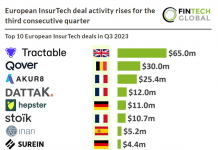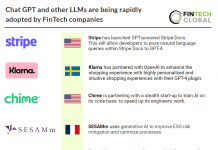The coronavirus pandemic has exposed a lot of problems with the way we do business. However, one of the biggest takeaways from the incident is the consumer’s desire for claims to be digital and touchless, according to a recent Insurance Nexus by Reuters Events Webinar.
The webinar, Claims Like Never Before – Agility, Leadership, and Collaboration for a Seamless Claims Experience, was moderated by Stephen Applebaum, managing partner at Insurance Solutions Group and explored how auto claims is changing. The discussion featured Tractable head of automotive James Spears, Allstate chief claims officer Eric Brandt, Liberty Mutual chief claims officer Mike Fiato and USAA chief claims officer Sean Burgess.
Currently, the world is going through an unprecedented event. Across the globe, the coronavirus has forced people to work remotely and stay in their homes unless there is an emergency or they need to go grocery shopping. People can no longer meet face-to-face with their insurer or conduct physical assessments for automotive claims, instead, they need to leverage digital solutions.
Companies are doing what they can to survive during this period. Governments and regulators are doing what they can to help curb the impact the pandemic will cause on businesses. A lot of this support has come in the form of loans. The US recently revealed a $2trn stimulus plan to aid businesses, families, loans, and hospitals, and Canada, the UK, France, Germany, Australia, India, Japan, Spain, and many other countries have created similar packages. Companies are in troubled times and will need to do what they can to survive.
“We’re in a period of disruption, but from disruption I believe can come transformation and growth,” added Eric Brandt, chief claims officer at US-based insurance firm Allstate. He went on to explain that there will be two types of mentalities companies will follow during this pandemic. “There will be the companies that lead through this change and lead through this period of disruption, making the industry better, probably by accelerating the pace of change we have been riding through. Then there will be a second group of companies that will ride it out, waiting for things to return to normalcy or some version of what we had in the past.”
The problem with the second group of companies is that it relies on the world going back to how it was pre-coronavirus, but that might not happen. Businesses have seen how they can still function efficiently with staff working remotely, and consumers are getting used to the idea of doing things exclusively online.
Mike Fiato, chief claims officer at US-insurer Liberty Mutual stated that carriers will need to start asking questions like, whether people actually go to the office, how many days they do go and whether the insurer would actually still need to send someone to assess a claim. Further to that, carriers will need to understand how customer expectations over the past couple of months have changed and if it’s to a point where it will not go back. “It’s going to be business as usual, in a new usual,” he added.
All of the speakers agreed that customer expectations have changed and they will stay this way even after quarantine. People are increasingly wanting their insurance to be digital and contact-free, ensuring their claims can be processed as quick as possible and with as little effort from their side as possible.
James Spears, head of automotive at AI-powered claims tool Tractable, said, “There has never been a better time in history for humans to better interface with technology than they are today. Look at what we’re doing right now, normally this would have been at a conference we would have flown to. That means that is what your customers are also doing. Your customers are becoming much more accustomed to being able to interface with technology and have that trust.” Customers have not had option to decide how they make a claim, instead they have been forced to do it whatever way they are told. After the pandemic and digital services are more widely available, consumers may be able to choose how they claim and can just digitally send their own photos of an incident complete claims online and receive an answer within minutes. He added, “you can even order your pizza contact fee and I’m certain claims are going to be contact free.”
As businesses are looking to meet the new customer expectation of a contact-free claims process, they will be looking to build the services in-house or partner with another company to offer it. Spears added that a lot of carriers in the industry still think there needs to be a goal of building contact-free claim solutions, when in fact “touchless claims are here today.”
Tractable, which was founded in 2014, is deploying AI-powered computer vision which can remotely appraise the damage in car accidents and natural disasters. Its technology is used by 15 insurers, spanning 12 countries, and has helped to process $1bn in claims. The technology, which can be integrated and customised for the needs of carriers, is built to meet the new demands of customers by improving the speed, accuracy and service.
The platform can provide carriers with a contact-free solution to handle automotive claims. It works by the policyholder simply uploading pictures of their damaged vehicle to the platform, where the AI will assess the damage to determine the costs of repair. After this has been completed in real-time, the claims handler makes a decision.
The company recently closed a $25m Series C round to help it extend this offering to help carriers operating around the world.
To view the full webinar click here.
API key not valid. Please pass a valid API key.Copyright © 2020 FinTech Global











